A Critical Analysis of Event Management Performance in Kathmandu
VerifiedAdded on 2023/05/04
|38
|9857
|56
AI Summary
This research proposal investigates the factors influencing the performance of event management companies in Kathmandu, Nepal, focusing on managerial skills, credit facilities, and supply chain networks. The study aims to address the challenges faced by event management businesses, particularly in the wake of the COVID-19 pandemic, and seeks to identify key determinants of success. The research employs both qualitative and quantitative methodologies, utilizing a descriptive survey approach and data collected from event planners in Kathmandu. The proposal outlines the research objectives, statement of the problem, research questions, literature review areas, and the theoretical framework based on the resource-based theory. It also includes a project plan with milestones and success criteria to ensure the study's objectives are met within the stipulated timeframe, ultimately contributing to a better understanding of event management dynamics in the Nepalese context. Desklib provides access to this and many other solved assignments.
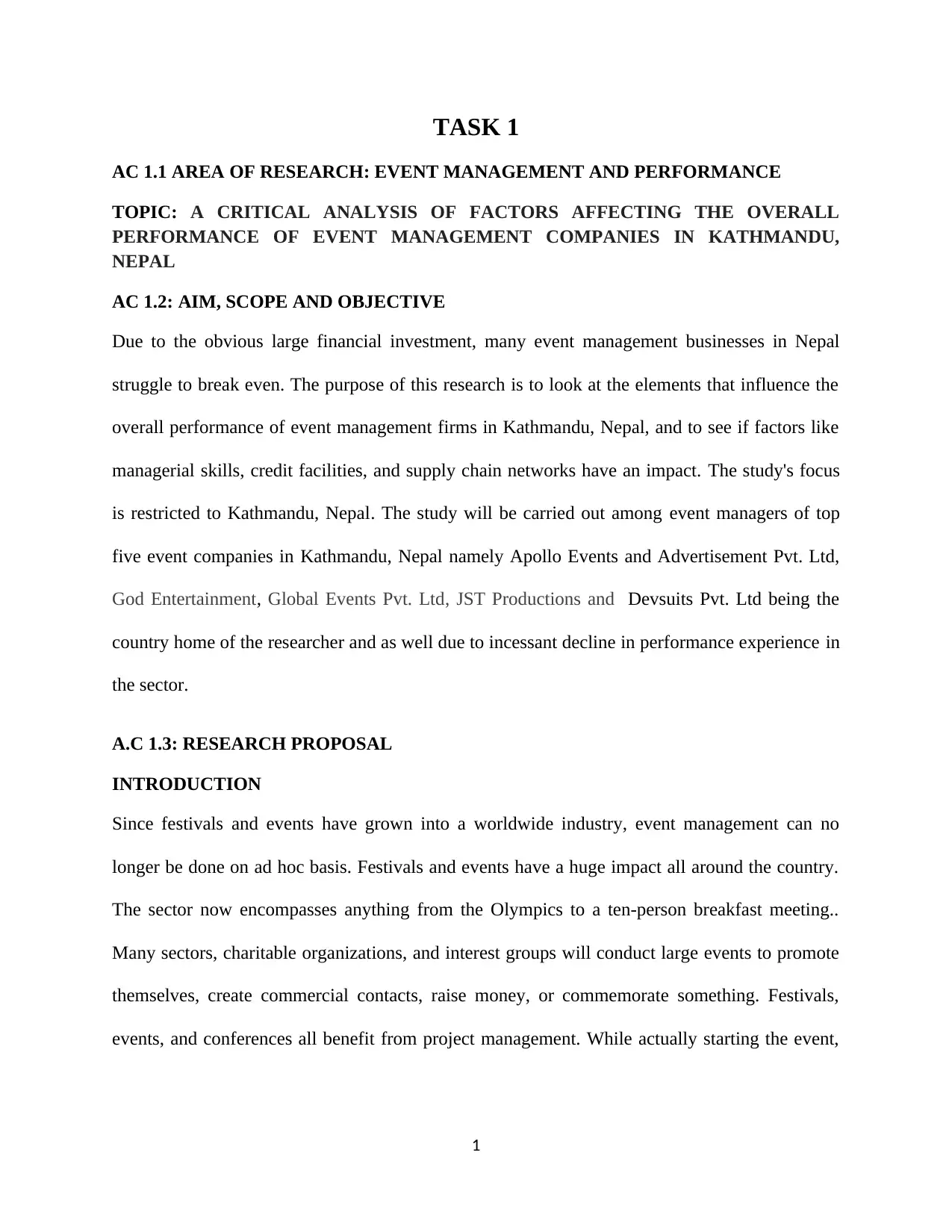
TASK 1
AC 1.1 AREA OF RESEARCH: EVENT MANAGEMENT AND PERFORMANCE
TOPIC: A CRITICAL ANALYSIS OF FACTORS AFFECTING THE OVERALL
PERFORMANCE OF EVENT MANAGEMENT COMPANIES IN KATHMANDU,
NEPAL
AC 1.2: AIM, SCOPE AND OBJECTIVE
Due to the obvious large financial investment, many event management businesses in Nepal
struggle to break even. The purpose of this research is to look at the elements that influence the
overall performance of event management firms in Kathmandu, Nepal, and to see if factors like
managerial skills, credit facilities, and supply chain networks have an impact. The study's focus
is restricted to Kathmandu, Nepal. The study will be carried out among event managers of top
five event companies in Kathmandu, Nepal namely Apollo Events and Advertisement Pvt. Ltd,
God Entertainment, Global Events Pvt. Ltd, JST Productions and Devsuits Pvt. Ltd being the
country home of the researcher and as well due to incessant decline in performance experience in
the sector.
A.C 1.3: RESEARCH PROPOSAL
INTRODUCTION
Since festivals and events have grown into a worldwide industry, event management can no
longer be done on ad hoc basis. Festivals and events have a huge impact all around the country.
The sector now encompasses anything from the Olympics to a ten-person breakfast meeting..
Many sectors, charitable organizations, and interest groups will conduct large events to promote
themselves, create commercial contacts, raise money, or commemorate something. Festivals,
events, and conferences all benefit from project management. While actually starting the event,
1
AC 1.1 AREA OF RESEARCH: EVENT MANAGEMENT AND PERFORMANCE
TOPIC: A CRITICAL ANALYSIS OF FACTORS AFFECTING THE OVERALL
PERFORMANCE OF EVENT MANAGEMENT COMPANIES IN KATHMANDU,
NEPAL
AC 1.2: AIM, SCOPE AND OBJECTIVE
Due to the obvious large financial investment, many event management businesses in Nepal
struggle to break even. The purpose of this research is to look at the elements that influence the
overall performance of event management firms in Kathmandu, Nepal, and to see if factors like
managerial skills, credit facilities, and supply chain networks have an impact. The study's focus
is restricted to Kathmandu, Nepal. The study will be carried out among event managers of top
five event companies in Kathmandu, Nepal namely Apollo Events and Advertisement Pvt. Ltd,
God Entertainment, Global Events Pvt. Ltd, JST Productions and Devsuits Pvt. Ltd being the
country home of the researcher and as well due to incessant decline in performance experience in
the sector.
A.C 1.3: RESEARCH PROPOSAL
INTRODUCTION
Since festivals and events have grown into a worldwide industry, event management can no
longer be done on ad hoc basis. Festivals and events have a huge impact all around the country.
The sector now encompasses anything from the Olympics to a ten-person breakfast meeting..
Many sectors, charitable organizations, and interest groups will conduct large events to promote
themselves, create commercial contacts, raise money, or commemorate something. Festivals,
events, and conferences all benefit from project management. While actually starting the event,
1
Paraphrase This Document
Need a fresh take? Get an instant paraphrase of this document with our AI Paraphraser
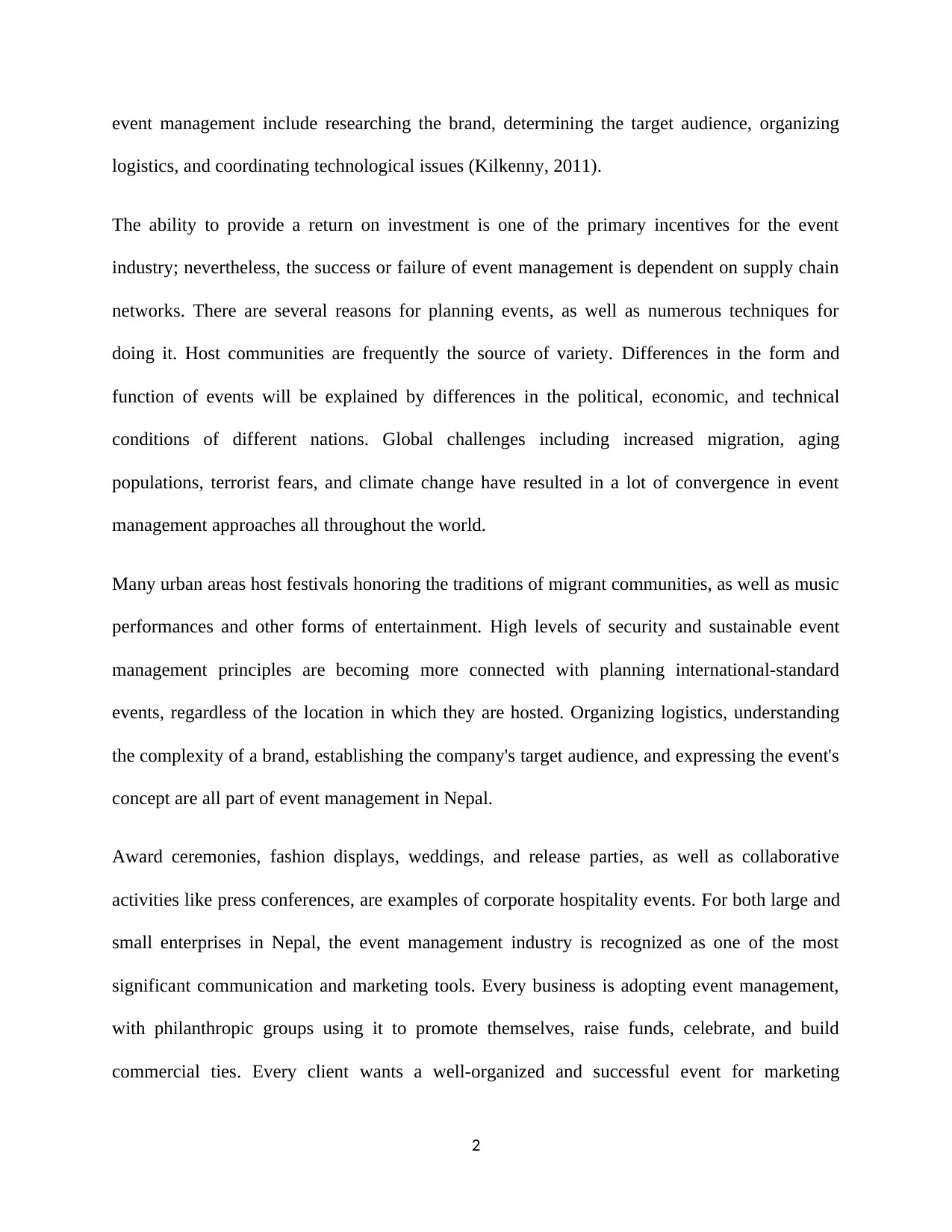
event management include researching the brand, determining the target audience, organizing
logistics, and coordinating technological issues (Kilkenny, 2011).
The ability to provide a return on investment is one of the primary incentives for the event
industry; nevertheless, the success or failure of event management is dependent on supply chain
networks. There are several reasons for planning events, as well as numerous techniques for
doing it. Host communities are frequently the source of variety. Differences in the form and
function of events will be explained by differences in the political, economic, and technical
conditions of different nations. Global challenges including increased migration, aging
populations, terrorist fears, and climate change have resulted in a lot of convergence in event
management approaches all throughout the world.
Many urban areas host festivals honoring the traditions of migrant communities, as well as music
performances and other forms of entertainment. High levels of security and sustainable event
management principles are becoming more connected with planning international-standard
events, regardless of the location in which they are hosted. Organizing logistics, understanding
the complexity of a brand, establishing the company's target audience, and expressing the event's
concept are all part of event management in Nepal.
Award ceremonies, fashion displays, weddings, and release parties, as well as collaborative
activities like press conferences, are examples of corporate hospitality events. For both large and
small enterprises in Nepal, the event management industry is recognized as one of the most
significant communication and marketing tools. Every business is adopting event management,
with philanthropic groups using it to promote themselves, raise funds, celebrate, and build
commercial ties. Every client wants a well-organized and successful event for marketing
2
logistics, and coordinating technological issues (Kilkenny, 2011).
The ability to provide a return on investment is one of the primary incentives for the event
industry; nevertheless, the success or failure of event management is dependent on supply chain
networks. There are several reasons for planning events, as well as numerous techniques for
doing it. Host communities are frequently the source of variety. Differences in the form and
function of events will be explained by differences in the political, economic, and technical
conditions of different nations. Global challenges including increased migration, aging
populations, terrorist fears, and climate change have resulted in a lot of convergence in event
management approaches all throughout the world.
Many urban areas host festivals honoring the traditions of migrant communities, as well as music
performances and other forms of entertainment. High levels of security and sustainable event
management principles are becoming more connected with planning international-standard
events, regardless of the location in which they are hosted. Organizing logistics, understanding
the complexity of a brand, establishing the company's target audience, and expressing the event's
concept are all part of event management in Nepal.
Award ceremonies, fashion displays, weddings, and release parties, as well as collaborative
activities like press conferences, are examples of corporate hospitality events. For both large and
small enterprises in Nepal, the event management industry is recognized as one of the most
significant communication and marketing tools. Every business is adopting event management,
with philanthropic groups using it to promote themselves, raise funds, celebrate, and build
commercial ties. Every client wants a well-organized and successful event for marketing
2
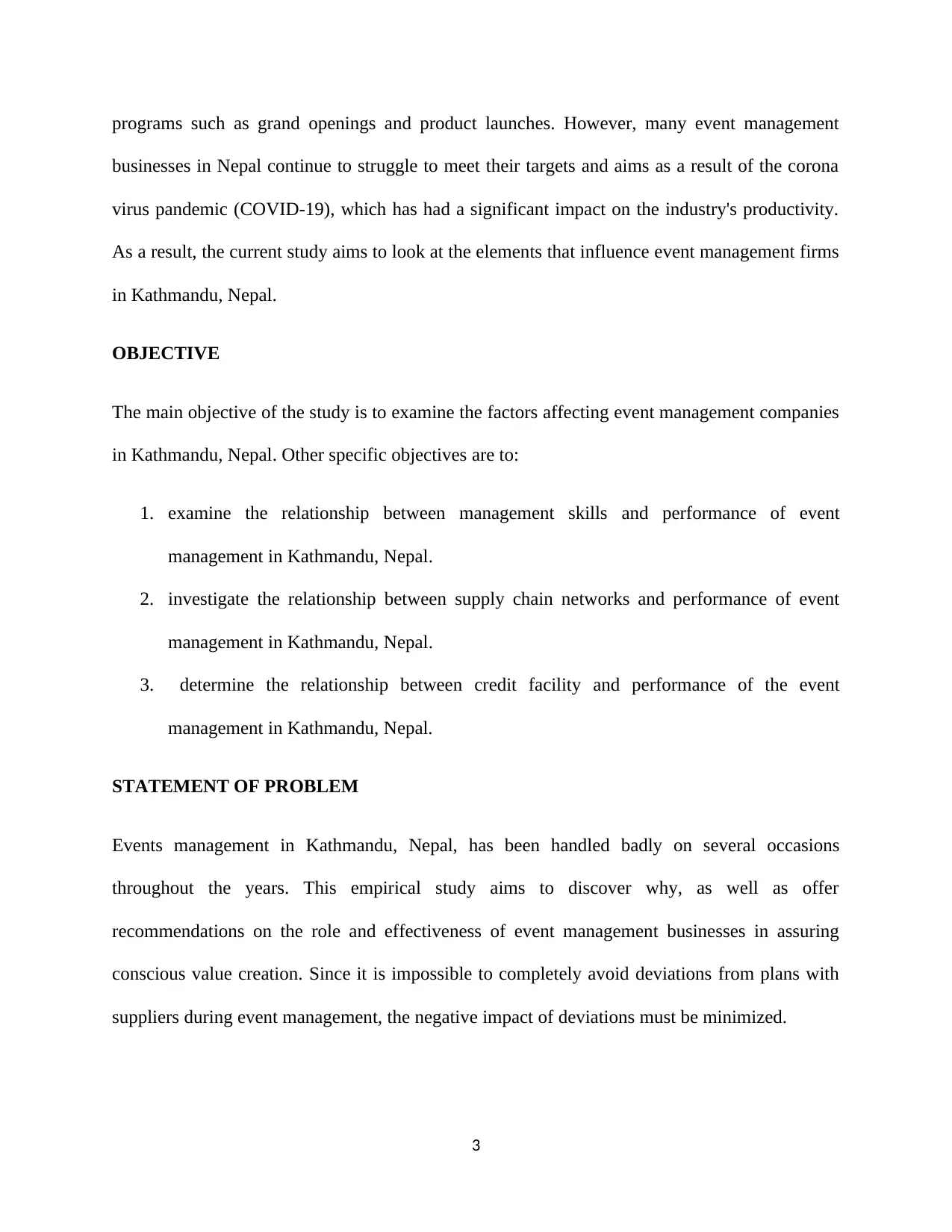
programs such as grand openings and product launches. However, many event management
businesses in Nepal continue to struggle to meet their targets and aims as a result of the corona
virus pandemic (COVID-19), which has had a significant impact on the industry's productivity.
As a result, the current study aims to look at the elements that influence event management firms
in Kathmandu, Nepal.
OBJECTIVE
The main objective of the study is to examine the factors affecting event management companies
in Kathmandu, Nepal. Other specific objectives are to:
1. examine the relationship between management skills and performance of event
management in Kathmandu, Nepal.
2. investigate the relationship between supply chain networks and performance of event
management in Kathmandu, Nepal.
3. determine the relationship between credit facility and performance of the event
management in Kathmandu, Nepal.
STATEMENT OF PROBLEM
Events management in Kathmandu, Nepal, has been handled badly on several occasions
throughout the years. This empirical study aims to discover why, as well as offer
recommendations on the role and effectiveness of event management businesses in assuring
conscious value creation. Since it is impossible to completely avoid deviations from plans with
suppliers during event management, the negative impact of deviations must be minimized.
3
businesses in Nepal continue to struggle to meet their targets and aims as a result of the corona
virus pandemic (COVID-19), which has had a significant impact on the industry's productivity.
As a result, the current study aims to look at the elements that influence event management firms
in Kathmandu, Nepal.
OBJECTIVE
The main objective of the study is to examine the factors affecting event management companies
in Kathmandu, Nepal. Other specific objectives are to:
1. examine the relationship between management skills and performance of event
management in Kathmandu, Nepal.
2. investigate the relationship between supply chain networks and performance of event
management in Kathmandu, Nepal.
3. determine the relationship between credit facility and performance of the event
management in Kathmandu, Nepal.
STATEMENT OF PROBLEM
Events management in Kathmandu, Nepal, has been handled badly on several occasions
throughout the years. This empirical study aims to discover why, as well as offer
recommendations on the role and effectiveness of event management businesses in assuring
conscious value creation. Since it is impossible to completely avoid deviations from plans with
suppliers during event management, the negative impact of deviations must be minimized.
3
⊘ This is a preview!⊘
Do you want full access?
Subscribe today to unlock all pages.

Trusted by 1+ million students worldwide
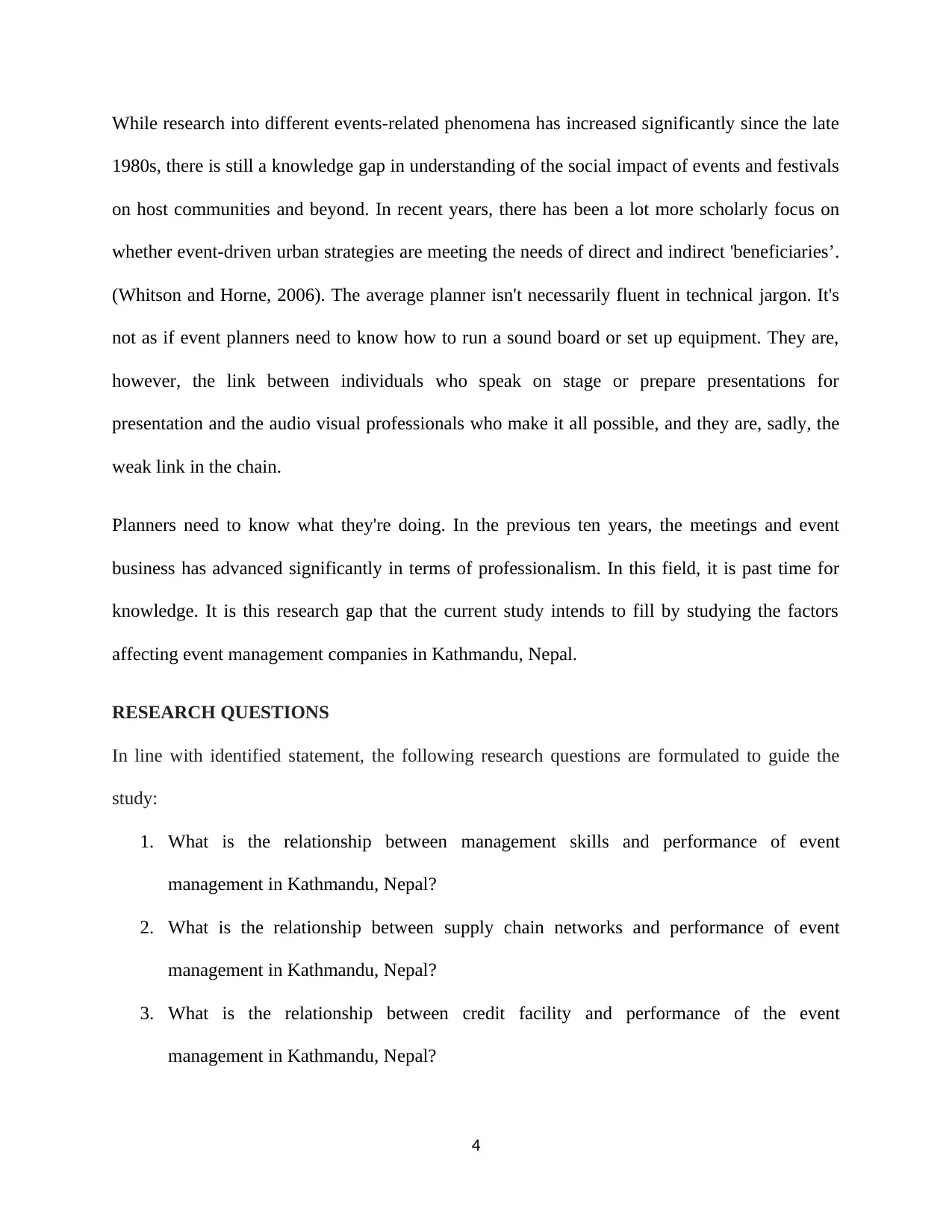
While research into different events-related phenomena has increased significantly since the late
1980s, there is still a knowledge gap in understanding of the social impact of events and festivals
on host communities and beyond. In recent years, there has been a lot more scholarly focus on
whether event-driven urban strategies are meeting the needs of direct and indirect 'beneficiaries’.
(Whitson and Horne, 2006). The average planner isn't necessarily fluent in technical jargon. It's
not as if event planners need to know how to run a sound board or set up equipment. They are,
however, the link between individuals who speak on stage or prepare presentations for
presentation and the audio visual professionals who make it all possible, and they are, sadly, the
weak link in the chain.
Planners need to know what they're doing. In the previous ten years, the meetings and event
business has advanced significantly in terms of professionalism. In this field, it is past time for
knowledge. It is this research gap that the current study intends to fill by studying the factors
affecting event management companies in Kathmandu, Nepal.
RESEARCH QUESTIONS
In line with identified statement, the following research questions are formulated to guide the
study:
1. What is the relationship between management skills and performance of event
management in Kathmandu, Nepal?
2. What is the relationship between supply chain networks and performance of event
management in Kathmandu, Nepal?
3. What is the relationship between credit facility and performance of the event
management in Kathmandu, Nepal?
4
1980s, there is still a knowledge gap in understanding of the social impact of events and festivals
on host communities and beyond. In recent years, there has been a lot more scholarly focus on
whether event-driven urban strategies are meeting the needs of direct and indirect 'beneficiaries’.
(Whitson and Horne, 2006). The average planner isn't necessarily fluent in technical jargon. It's
not as if event planners need to know how to run a sound board or set up equipment. They are,
however, the link between individuals who speak on stage or prepare presentations for
presentation and the audio visual professionals who make it all possible, and they are, sadly, the
weak link in the chain.
Planners need to know what they're doing. In the previous ten years, the meetings and event
business has advanced significantly in terms of professionalism. In this field, it is past time for
knowledge. It is this research gap that the current study intends to fill by studying the factors
affecting event management companies in Kathmandu, Nepal.
RESEARCH QUESTIONS
In line with identified statement, the following research questions are formulated to guide the
study:
1. What is the relationship between management skills and performance of event
management in Kathmandu, Nepal?
2. What is the relationship between supply chain networks and performance of event
management in Kathmandu, Nepal?
3. What is the relationship between credit facility and performance of the event
management in Kathmandu, Nepal?
4
Paraphrase This Document
Need a fresh take? Get an instant paraphrase of this document with our AI Paraphraser
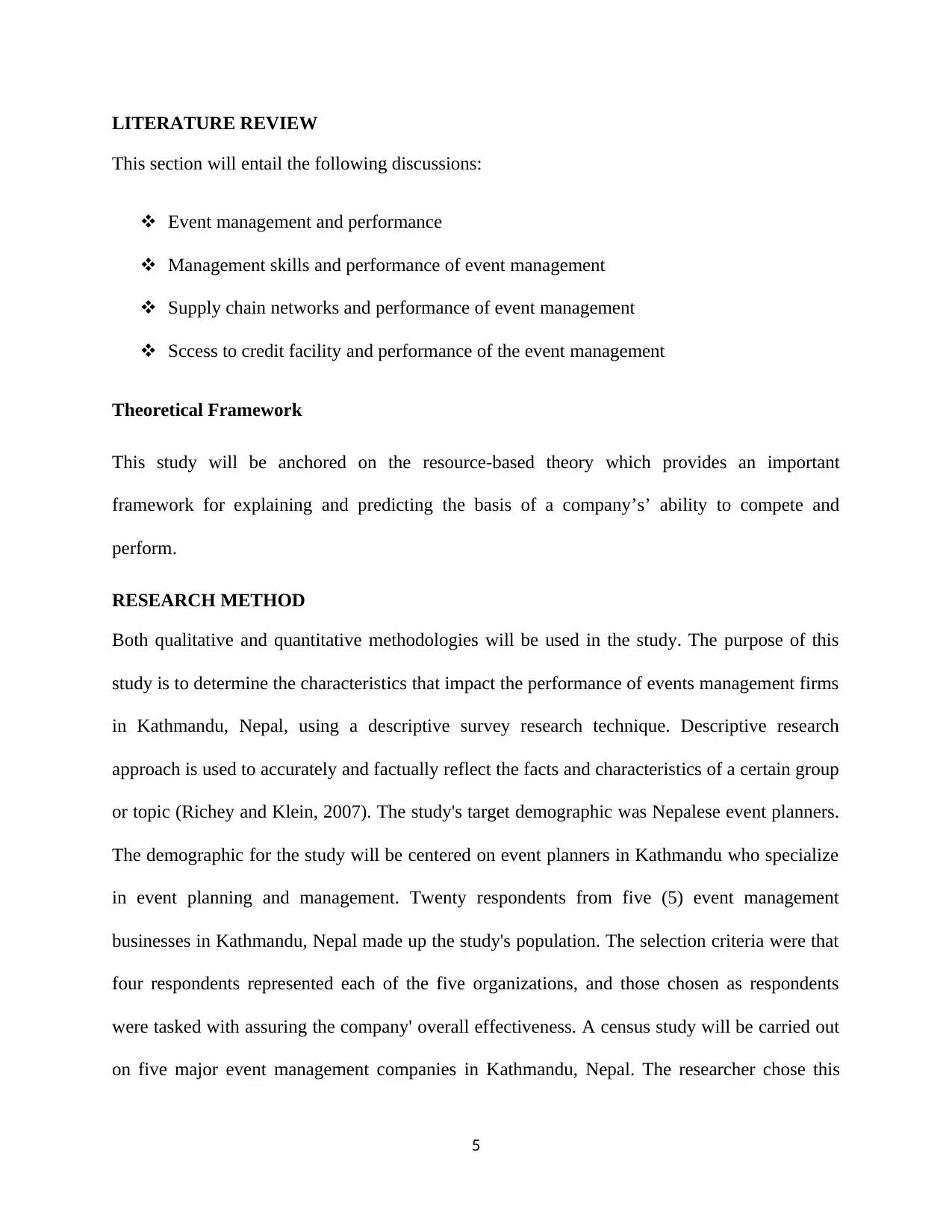
LITERATURE REVIEW
This section will entail the following discussions:
Event management and performance
Management skills and performance of event management
Supply chain networks and performance of event management
Sccess to credit facility and performance of the event management
Theoretical Framework
This study will be anchored on the resource-based theory which provides an important
framework for explaining and predicting the basis of a company’s’ ability to compete and
perform.
RESEARCH METHOD
Both qualitative and quantitative methodologies will be used in the study. The purpose of this
study is to determine the characteristics that impact the performance of events management firms
in Kathmandu, Nepal, using a descriptive survey research technique. Descriptive research
approach is used to accurately and factually reflect the facts and characteristics of a certain group
or topic (Richey and Klein, 2007). The study's target demographic was Nepalese event planners.
The demographic for the study will be centered on event planners in Kathmandu who specialize
in event planning and management. Twenty respondents from five (5) event management
businesses in Kathmandu, Nepal made up the study's population. The selection criteria were that
four respondents represented each of the five organizations, and those chosen as respondents
were tasked with assuring the company' overall effectiveness. A census study will be carried out
on five major event management companies in Kathmandu, Nepal. The researcher chose this
5
This section will entail the following discussions:
Event management and performance
Management skills and performance of event management
Supply chain networks and performance of event management
Sccess to credit facility and performance of the event management
Theoretical Framework
This study will be anchored on the resource-based theory which provides an important
framework for explaining and predicting the basis of a company’s’ ability to compete and
perform.
RESEARCH METHOD
Both qualitative and quantitative methodologies will be used in the study. The purpose of this
study is to determine the characteristics that impact the performance of events management firms
in Kathmandu, Nepal, using a descriptive survey research technique. Descriptive research
approach is used to accurately and factually reflect the facts and characteristics of a certain group
or topic (Richey and Klein, 2007). The study's target demographic was Nepalese event planners.
The demographic for the study will be centered on event planners in Kathmandu who specialize
in event planning and management. Twenty respondents from five (5) event management
businesses in Kathmandu, Nepal made up the study's population. The selection criteria were that
four respondents represented each of the five organizations, and those chosen as respondents
were tasked with assuring the company' overall effectiveness. A census study will be carried out
on five major event management companies in Kathmandu, Nepal. The researcher chose this
5
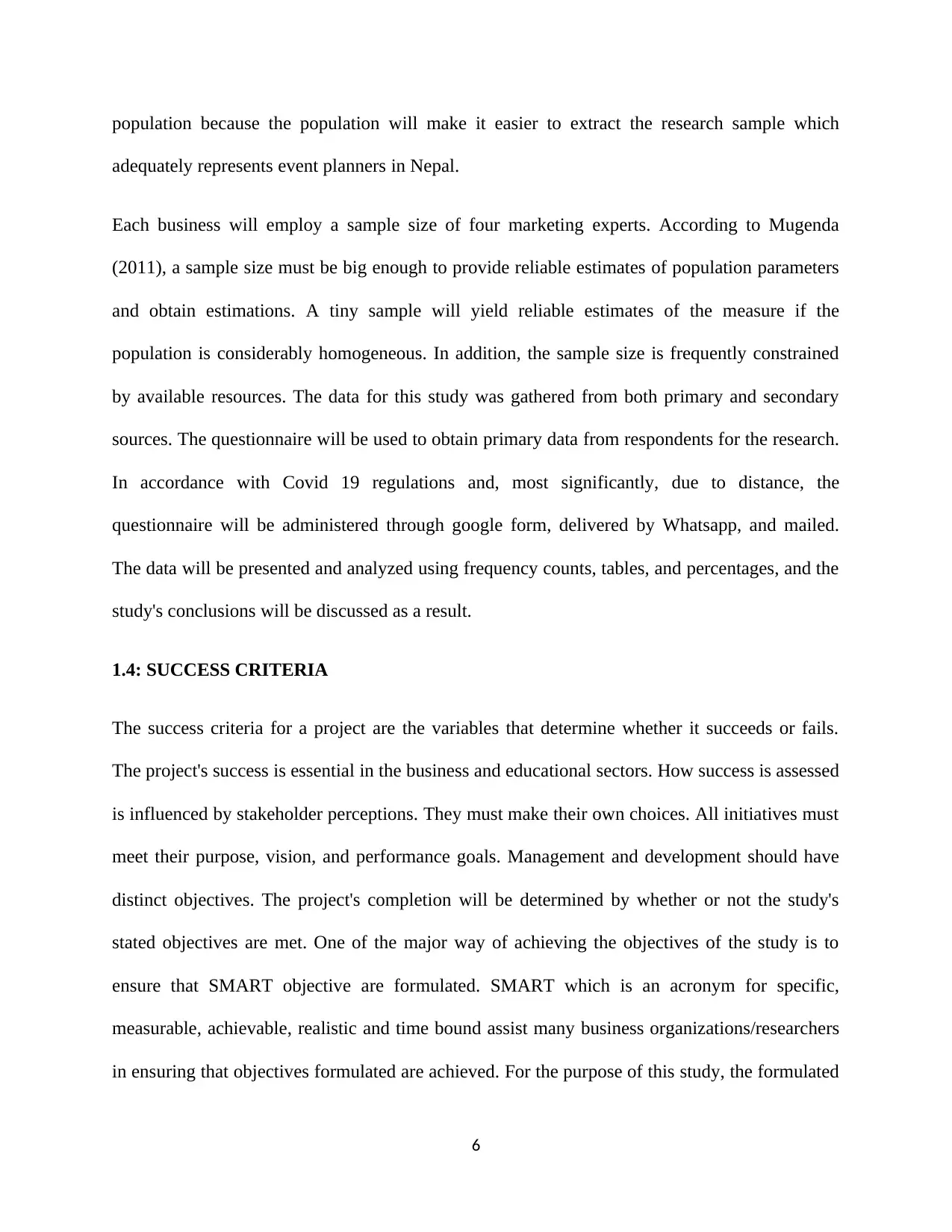
population because the population will make it easier to extract the research sample which
adequately represents event planners in Nepal.
Each business will employ a sample size of four marketing experts. According to Mugenda
(2011), a sample size must be big enough to provide reliable estimates of population parameters
and obtain estimations. A tiny sample will yield reliable estimates of the measure if the
population is considerably homogeneous. In addition, the sample size is frequently constrained
by available resources. The data for this study was gathered from both primary and secondary
sources. The questionnaire will be used to obtain primary data from respondents for the research.
In accordance with Covid 19 regulations and, most significantly, due to distance, the
questionnaire will be administered through google form, delivered by Whatsapp, and mailed.
The data will be presented and analyzed using frequency counts, tables, and percentages, and the
study's conclusions will be discussed as a result.
1.4: SUCCESS CRITERIA
The success criteria for a project are the variables that determine whether it succeeds or fails.
The project's success is essential in the business and educational sectors. How success is assessed
is influenced by stakeholder perceptions. They must make their own choices. All initiatives must
meet their purpose, vision, and performance goals. Management and development should have
distinct objectives. The project's completion will be determined by whether or not the study's
stated objectives are met. One of the major way of achieving the objectives of the study is to
ensure that SMART objective are formulated. SMART which is an acronym for specific,
measurable, achievable, realistic and time bound assist many business organizations/researchers
in ensuring that objectives formulated are achieved. For the purpose of this study, the formulated
6
adequately represents event planners in Nepal.
Each business will employ a sample size of four marketing experts. According to Mugenda
(2011), a sample size must be big enough to provide reliable estimates of population parameters
and obtain estimations. A tiny sample will yield reliable estimates of the measure if the
population is considerably homogeneous. In addition, the sample size is frequently constrained
by available resources. The data for this study was gathered from both primary and secondary
sources. The questionnaire will be used to obtain primary data from respondents for the research.
In accordance with Covid 19 regulations and, most significantly, due to distance, the
questionnaire will be administered through google form, delivered by Whatsapp, and mailed.
The data will be presented and analyzed using frequency counts, tables, and percentages, and the
study's conclusions will be discussed as a result.
1.4: SUCCESS CRITERIA
The success criteria for a project are the variables that determine whether it succeeds or fails.
The project's success is essential in the business and educational sectors. How success is assessed
is influenced by stakeholder perceptions. They must make their own choices. All initiatives must
meet their purpose, vision, and performance goals. Management and development should have
distinct objectives. The project's completion will be determined by whether or not the study's
stated objectives are met. One of the major way of achieving the objectives of the study is to
ensure that SMART objective are formulated. SMART which is an acronym for specific,
measurable, achievable, realistic and time bound assist many business organizations/researchers
in ensuring that objectives formulated are achieved. For the purpose of this study, the formulated
6
⊘ This is a preview!⊘
Do you want full access?
Subscribe today to unlock all pages.

Trusted by 1+ million students worldwide
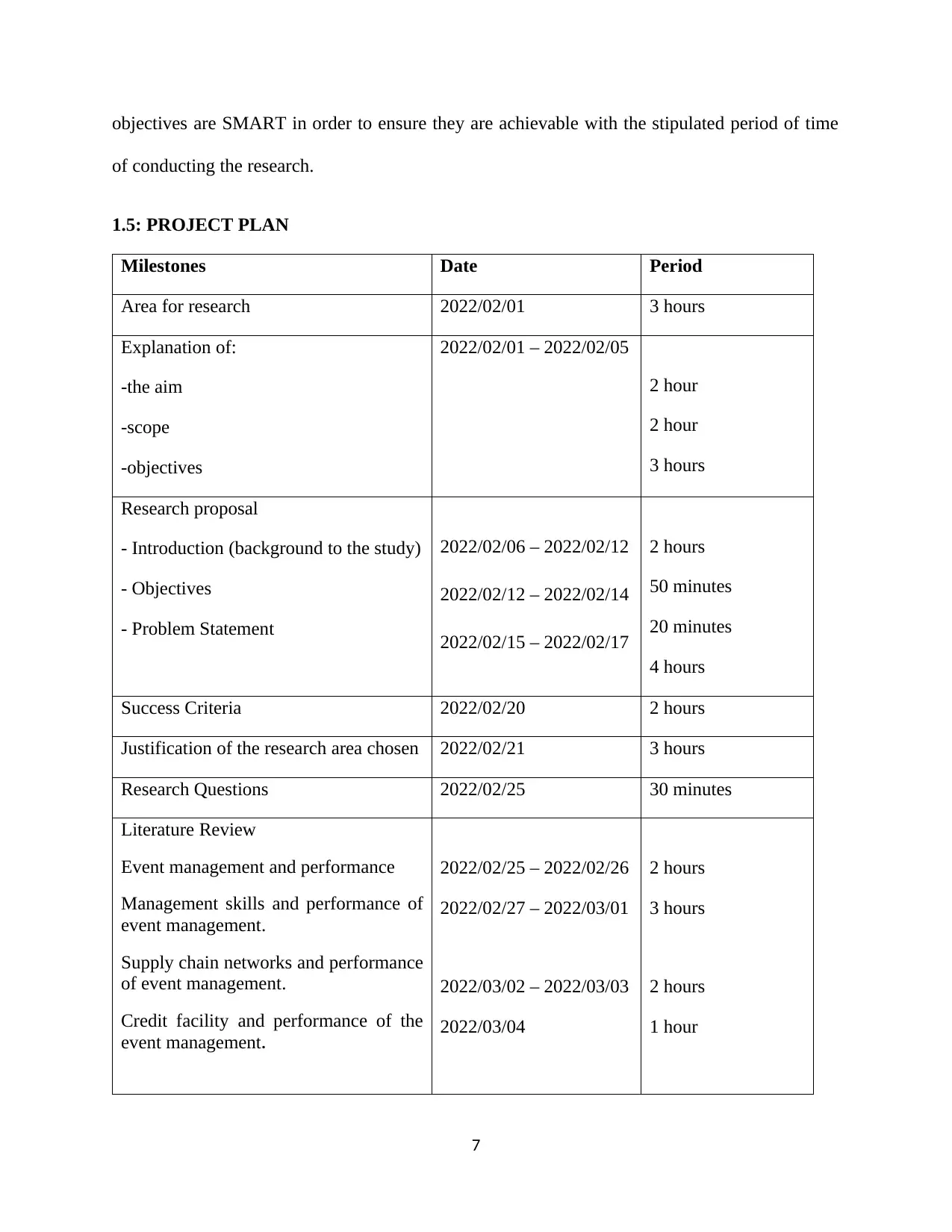
objectives are SMART in order to ensure they are achievable with the stipulated period of time
of conducting the research.
1.5: PROJECT PLAN
Milestones Date Period
Area for research 2022/02/01 3 hours
Explanation of:
-the aim
-scope
-objectives
2022/02/01 – 2022/02/05
2 hour
2 hour
3 hours
Research proposal
- Introduction (background to the study)
- Objectives
- Problem Statement
2022/02/06 – 2022/02/12
2022/02/12 – 2022/02/14
2022/02/15 – 2022/02/17
2 hours
50 minutes
20 minutes
4 hours
Success Criteria 2022/02/20 2 hours
Justification of the research area chosen 2022/02/21 3 hours
Research Questions 2022/02/25 30 minutes
Literature Review
Event management and performance
Management skills and performance of
event management.
Supply chain networks and performance
of event management.
Credit facility and performance of the
event management.
2022/02/25 – 2022/02/26
2022/02/27 – 2022/03/01
2022/03/02 – 2022/03/03
2022/03/04
2 hours
3 hours
2 hours
1 hour
7
of conducting the research.
1.5: PROJECT PLAN
Milestones Date Period
Area for research 2022/02/01 3 hours
Explanation of:
-the aim
-scope
-objectives
2022/02/01 – 2022/02/05
2 hour
2 hour
3 hours
Research proposal
- Introduction (background to the study)
- Objectives
- Problem Statement
2022/02/06 – 2022/02/12
2022/02/12 – 2022/02/14
2022/02/15 – 2022/02/17
2 hours
50 minutes
20 minutes
4 hours
Success Criteria 2022/02/20 2 hours
Justification of the research area chosen 2022/02/21 3 hours
Research Questions 2022/02/25 30 minutes
Literature Review
Event management and performance
Management skills and performance of
event management.
Supply chain networks and performance
of event management.
Credit facility and performance of the
event management.
2022/02/25 – 2022/02/26
2022/02/27 – 2022/03/01
2022/03/02 – 2022/03/03
2022/03/04
2 hours
3 hours
2 hours
1 hour
7
Paraphrase This Document
Need a fresh take? Get an instant paraphrase of this document with our AI Paraphraser
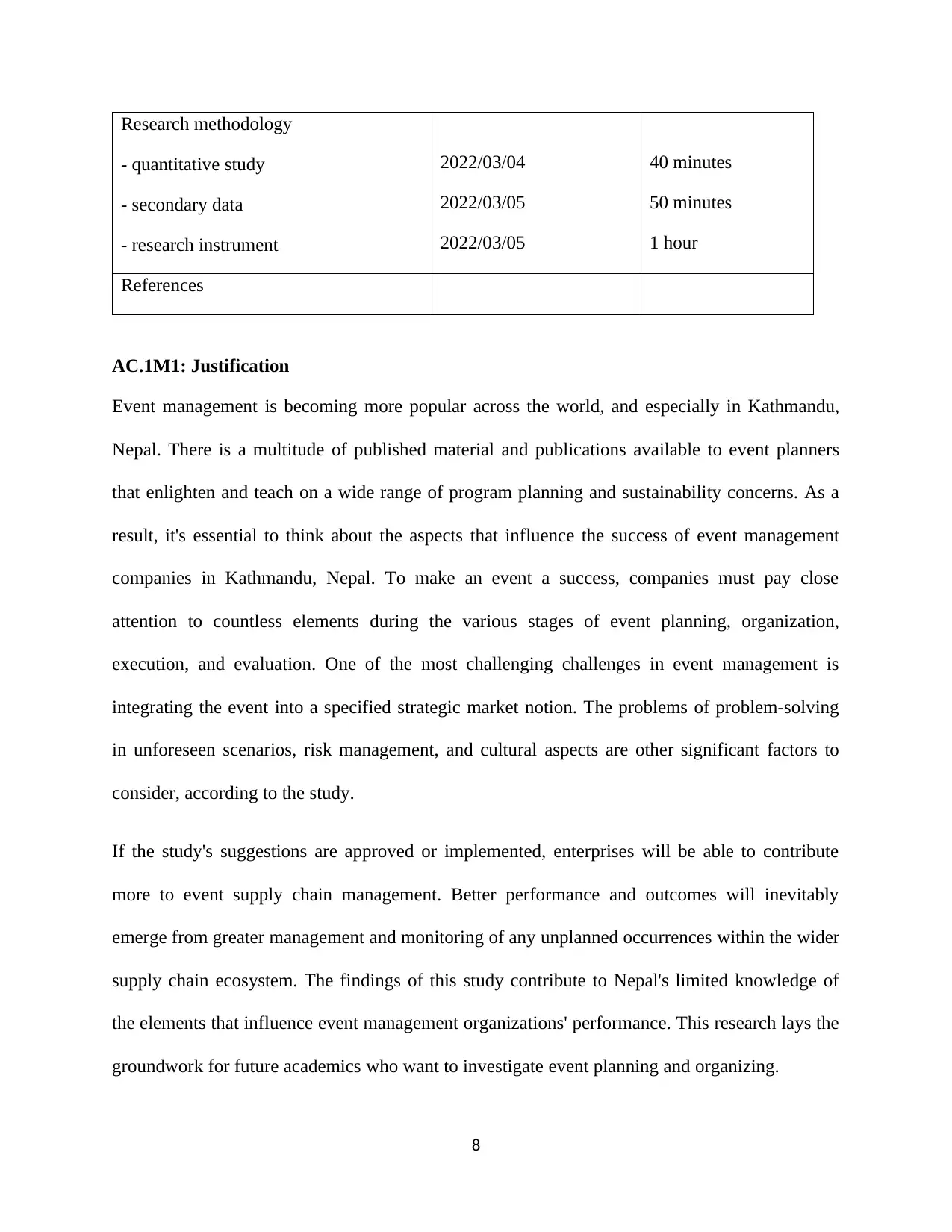
Research methodology
- quantitative study
- secondary data
- research instrument
2022/03/04
2022/03/05
2022/03/05
40 minutes
50 minutes
1 hour
References
AC.1M1: Justification
Event management is becoming more popular across the world, and especially in Kathmandu,
Nepal. There is a multitude of published material and publications available to event planners
that enlighten and teach on a wide range of program planning and sustainability concerns. As a
result, it's essential to think about the aspects that influence the success of event management
companies in Kathmandu, Nepal. To make an event a success, companies must pay close
attention to countless elements during the various stages of event planning, organization,
execution, and evaluation. One of the most challenging challenges in event management is
integrating the event into a specified strategic market notion. The problems of problem-solving
in unforeseen scenarios, risk management, and cultural aspects are other significant factors to
consider, according to the study.
If the study's suggestions are approved or implemented, enterprises will be able to contribute
more to event supply chain management. Better performance and outcomes will inevitably
emerge from greater management and monitoring of any unplanned occurrences within the wider
supply chain ecosystem. The findings of this study contribute to Nepal's limited knowledge of
the elements that influence event management organizations' performance. This research lays the
groundwork for future academics who want to investigate event planning and organizing.
8
- quantitative study
- secondary data
- research instrument
2022/03/04
2022/03/05
2022/03/05
40 minutes
50 minutes
1 hour
References
AC.1M1: Justification
Event management is becoming more popular across the world, and especially in Kathmandu,
Nepal. There is a multitude of published material and publications available to event planners
that enlighten and teach on a wide range of program planning and sustainability concerns. As a
result, it's essential to think about the aspects that influence the success of event management
companies in Kathmandu, Nepal. To make an event a success, companies must pay close
attention to countless elements during the various stages of event planning, organization,
execution, and evaluation. One of the most challenging challenges in event management is
integrating the event into a specified strategic market notion. The problems of problem-solving
in unforeseen scenarios, risk management, and cultural aspects are other significant factors to
consider, according to the study.
If the study's suggestions are approved or implemented, enterprises will be able to contribute
more to event supply chain management. Better performance and outcomes will inevitably
emerge from greater management and monitoring of any unplanned occurrences within the wider
supply chain ecosystem. The findings of this study contribute to Nepal's limited knowledge of
the elements that influence event management organizations' performance. This research lays the
groundwork for future academics who want to investigate event planning and organizing.
8
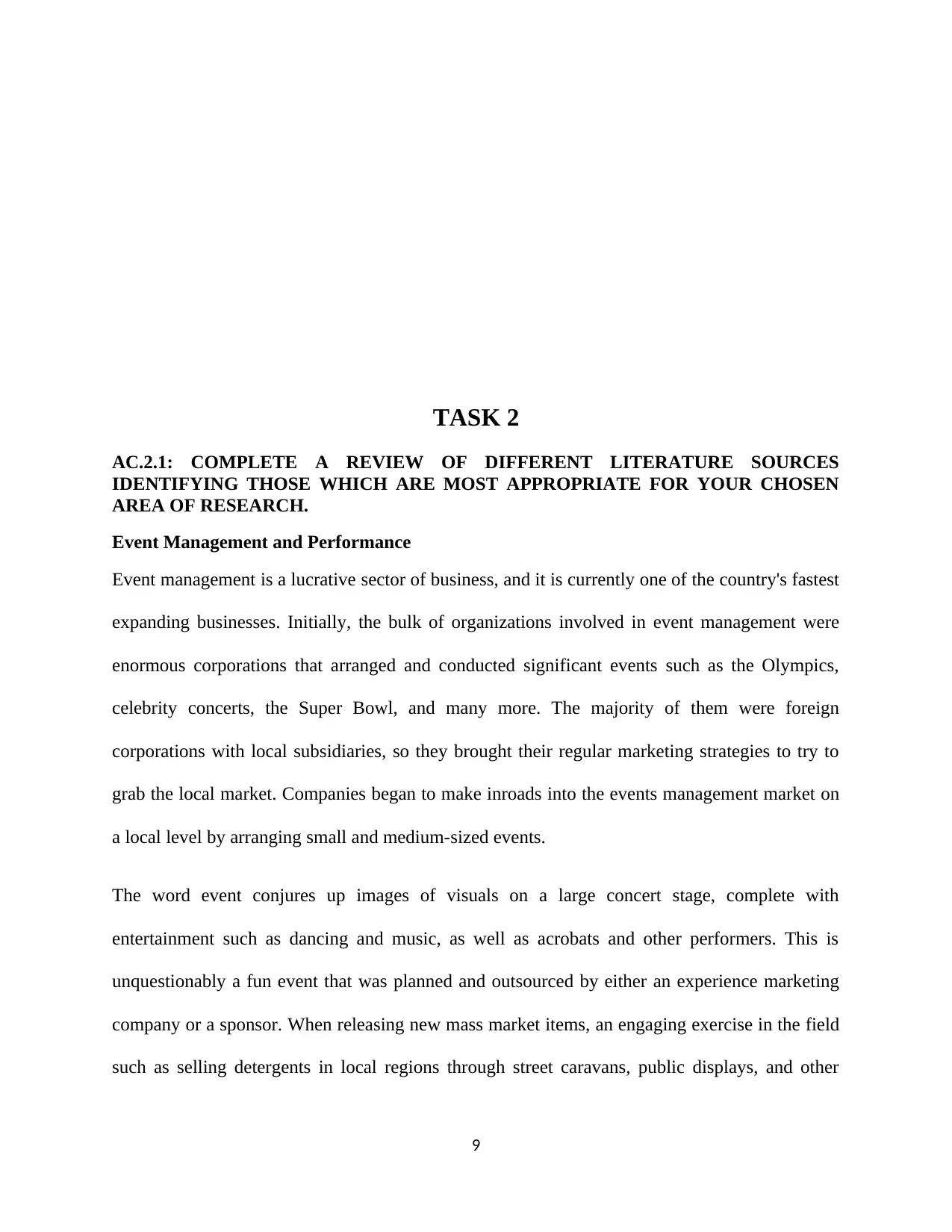
TASK 2
AC.2.1: COMPLETE A REVIEW OF DIFFERENT LITERATURE SOURCES
IDENTIFYING THOSE WHICH ARE MOST APPROPRIATE FOR YOUR CHOSEN
AREA OF RESEARCH.
Event Management and Performance
Event management is a lucrative sector of business, and it is currently one of the country's fastest
expanding businesses. Initially, the bulk of organizations involved in event management were
enormous corporations that arranged and conducted significant events such as the Olympics,
celebrity concerts, the Super Bowl, and many more. The majority of them were foreign
corporations with local subsidiaries, so they brought their regular marketing strategies to try to
grab the local market. Companies began to make inroads into the events management market on
a local level by arranging small and medium-sized events.
The word event conjures up images of visuals on a large concert stage, complete with
entertainment such as dancing and music, as well as acrobats and other performers. This is
unquestionably a fun event that was planned and outsourced by either an experience marketing
company or a sponsor. When releasing new mass market items, an engaging exercise in the field
such as selling detergents in local regions through street caravans, public displays, and other
9
AC.2.1: COMPLETE A REVIEW OF DIFFERENT LITERATURE SOURCES
IDENTIFYING THOSE WHICH ARE MOST APPROPRIATE FOR YOUR CHOSEN
AREA OF RESEARCH.
Event Management and Performance
Event management is a lucrative sector of business, and it is currently one of the country's fastest
expanding businesses. Initially, the bulk of organizations involved in event management were
enormous corporations that arranged and conducted significant events such as the Olympics,
celebrity concerts, the Super Bowl, and many more. The majority of them were foreign
corporations with local subsidiaries, so they brought their regular marketing strategies to try to
grab the local market. Companies began to make inroads into the events management market on
a local level by arranging small and medium-sized events.
The word event conjures up images of visuals on a large concert stage, complete with
entertainment such as dancing and music, as well as acrobats and other performers. This is
unquestionably a fun event that was planned and outsourced by either an experience marketing
company or a sponsor. When releasing new mass market items, an engaging exercise in the field
such as selling detergents in local regions through street caravans, public displays, and other
9
⊘ This is a preview!⊘
Do you want full access?
Subscribe today to unlock all pages.

Trusted by 1+ million students worldwide
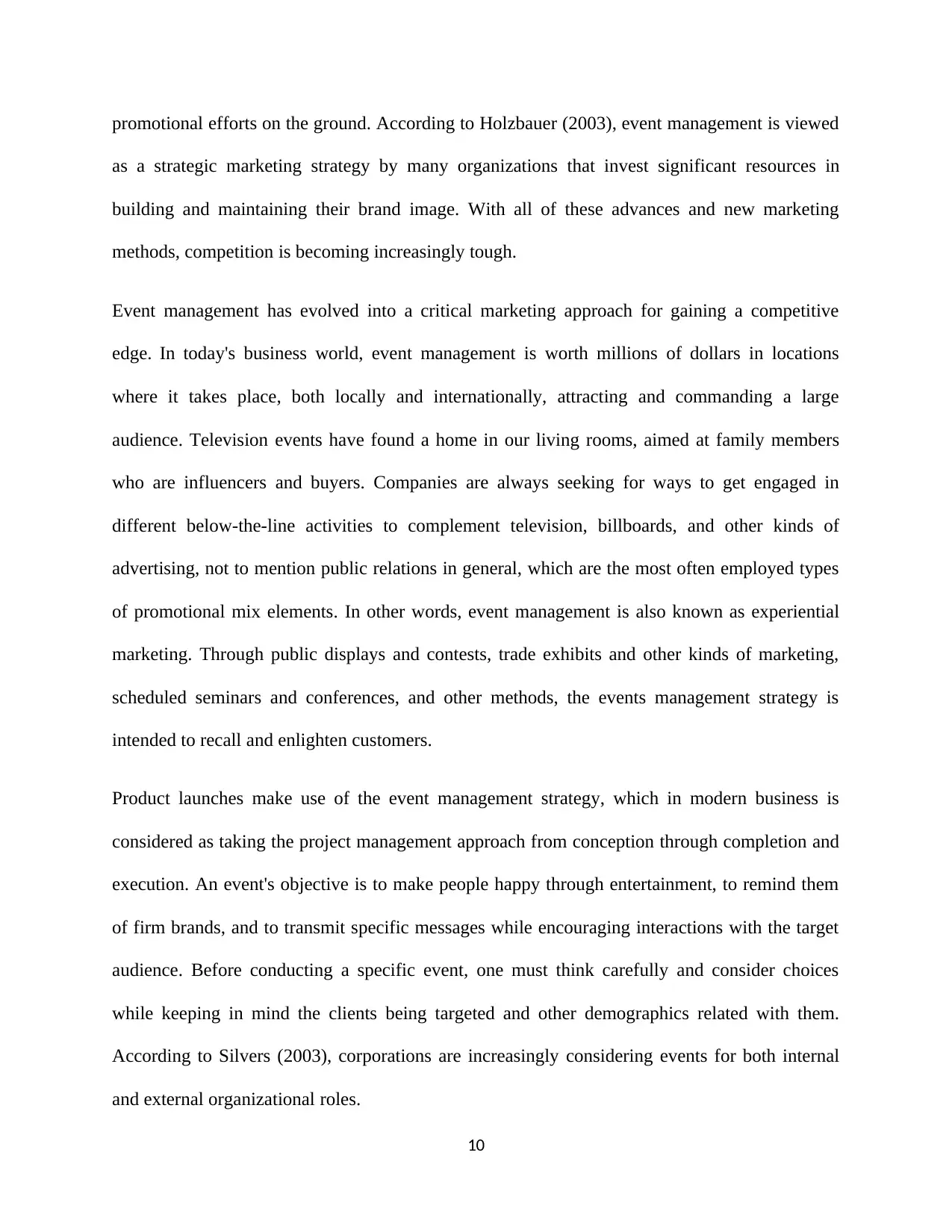
promotional efforts on the ground. According to Holzbauer (2003), event management is viewed
as a strategic marketing strategy by many organizations that invest significant resources in
building and maintaining their brand image. With all of these advances and new marketing
methods, competition is becoming increasingly tough.
Event management has evolved into a critical marketing approach for gaining a competitive
edge. In today's business world, event management is worth millions of dollars in locations
where it takes place, both locally and internationally, attracting and commanding a large
audience. Television events have found a home in our living rooms, aimed at family members
who are influencers and buyers. Companies are always seeking for ways to get engaged in
different below-the-line activities to complement television, billboards, and other kinds of
advertising, not to mention public relations in general, which are the most often employed types
of promotional mix elements. In other words, event management is also known as experiential
marketing. Through public displays and contests, trade exhibits and other kinds of marketing,
scheduled seminars and conferences, and other methods, the events management strategy is
intended to recall and enlighten customers.
Product launches make use of the event management strategy, which in modern business is
considered as taking the project management approach from conception through completion and
execution. An event's objective is to make people happy through entertainment, to remind them
of firm brands, and to transmit specific messages while encouraging interactions with the target
audience. Before conducting a specific event, one must think carefully and consider choices
while keeping in mind the clients being targeted and other demographics related with them.
According to Silvers (2003), corporations are increasingly considering events for both internal
and external organizational roles.
10
as a strategic marketing strategy by many organizations that invest significant resources in
building and maintaining their brand image. With all of these advances and new marketing
methods, competition is becoming increasingly tough.
Event management has evolved into a critical marketing approach for gaining a competitive
edge. In today's business world, event management is worth millions of dollars in locations
where it takes place, both locally and internationally, attracting and commanding a large
audience. Television events have found a home in our living rooms, aimed at family members
who are influencers and buyers. Companies are always seeking for ways to get engaged in
different below-the-line activities to complement television, billboards, and other kinds of
advertising, not to mention public relations in general, which are the most often employed types
of promotional mix elements. In other words, event management is also known as experiential
marketing. Through public displays and contests, trade exhibits and other kinds of marketing,
scheduled seminars and conferences, and other methods, the events management strategy is
intended to recall and enlighten customers.
Product launches make use of the event management strategy, which in modern business is
considered as taking the project management approach from conception through completion and
execution. An event's objective is to make people happy through entertainment, to remind them
of firm brands, and to transmit specific messages while encouraging interactions with the target
audience. Before conducting a specific event, one must think carefully and consider choices
while keeping in mind the clients being targeted and other demographics related with them.
According to Silvers (2003), corporations are increasingly considering events for both internal
and external organizational roles.
10
Paraphrase This Document
Need a fresh take? Get an instant paraphrase of this document with our AI Paraphraser
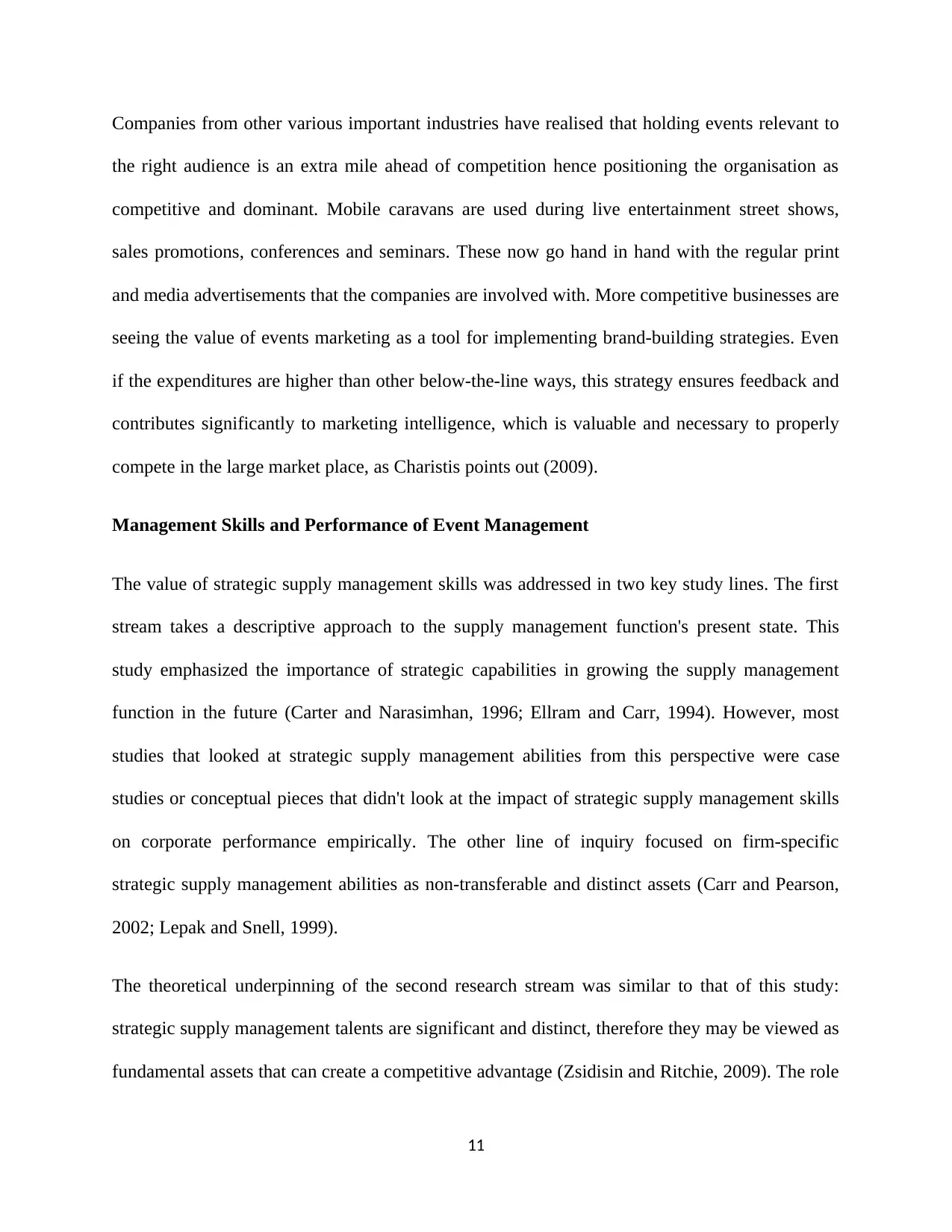
Companies from other various important industries have realised that holding events relevant to
the right audience is an extra mile ahead of competition hence positioning the organisation as
competitive and dominant. Mobile caravans are used during live entertainment street shows,
sales promotions, conferences and seminars. These now go hand in hand with the regular print
and media advertisements that the companies are involved with. More competitive businesses are
seeing the value of events marketing as a tool for implementing brand-building strategies. Even
if the expenditures are higher than other below-the-line ways, this strategy ensures feedback and
contributes significantly to marketing intelligence, which is valuable and necessary to properly
compete in the large market place, as Charistis points out (2009).
Management Skills and Performance of Event Management
The value of strategic supply management skills was addressed in two key study lines. The first
stream takes a descriptive approach to the supply management function's present state. This
study emphasized the importance of strategic capabilities in growing the supply management
function in the future (Carter and Narasimhan, 1996; Ellram and Carr, 1994). However, most
studies that looked at strategic supply management abilities from this perspective were case
studies or conceptual pieces that didn't look at the impact of strategic supply management skills
on corporate performance empirically. The other line of inquiry focused on firm-specific
strategic supply management abilities as non-transferable and distinct assets (Carr and Pearson,
2002; Lepak and Snell, 1999).
The theoretical underpinning of the second research stream was similar to that of this study:
strategic supply management talents are significant and distinct, therefore they may be viewed as
fundamental assets that can create a competitive advantage (Zsidisin and Ritchie, 2009). The role
11
the right audience is an extra mile ahead of competition hence positioning the organisation as
competitive and dominant. Mobile caravans are used during live entertainment street shows,
sales promotions, conferences and seminars. These now go hand in hand with the regular print
and media advertisements that the companies are involved with. More competitive businesses are
seeing the value of events marketing as a tool for implementing brand-building strategies. Even
if the expenditures are higher than other below-the-line ways, this strategy ensures feedback and
contributes significantly to marketing intelligence, which is valuable and necessary to properly
compete in the large market place, as Charistis points out (2009).
Management Skills and Performance of Event Management
The value of strategic supply management skills was addressed in two key study lines. The first
stream takes a descriptive approach to the supply management function's present state. This
study emphasized the importance of strategic capabilities in growing the supply management
function in the future (Carter and Narasimhan, 1996; Ellram and Carr, 1994). However, most
studies that looked at strategic supply management abilities from this perspective were case
studies or conceptual pieces that didn't look at the impact of strategic supply management skills
on corporate performance empirically. The other line of inquiry focused on firm-specific
strategic supply management abilities as non-transferable and distinct assets (Carr and Pearson,
2002; Lepak and Snell, 1999).
The theoretical underpinning of the second research stream was similar to that of this study:
strategic supply management talents are significant and distinct, therefore they may be viewed as
fundamental assets that can create a competitive advantage (Zsidisin and Ritchie, 2009). The role
11
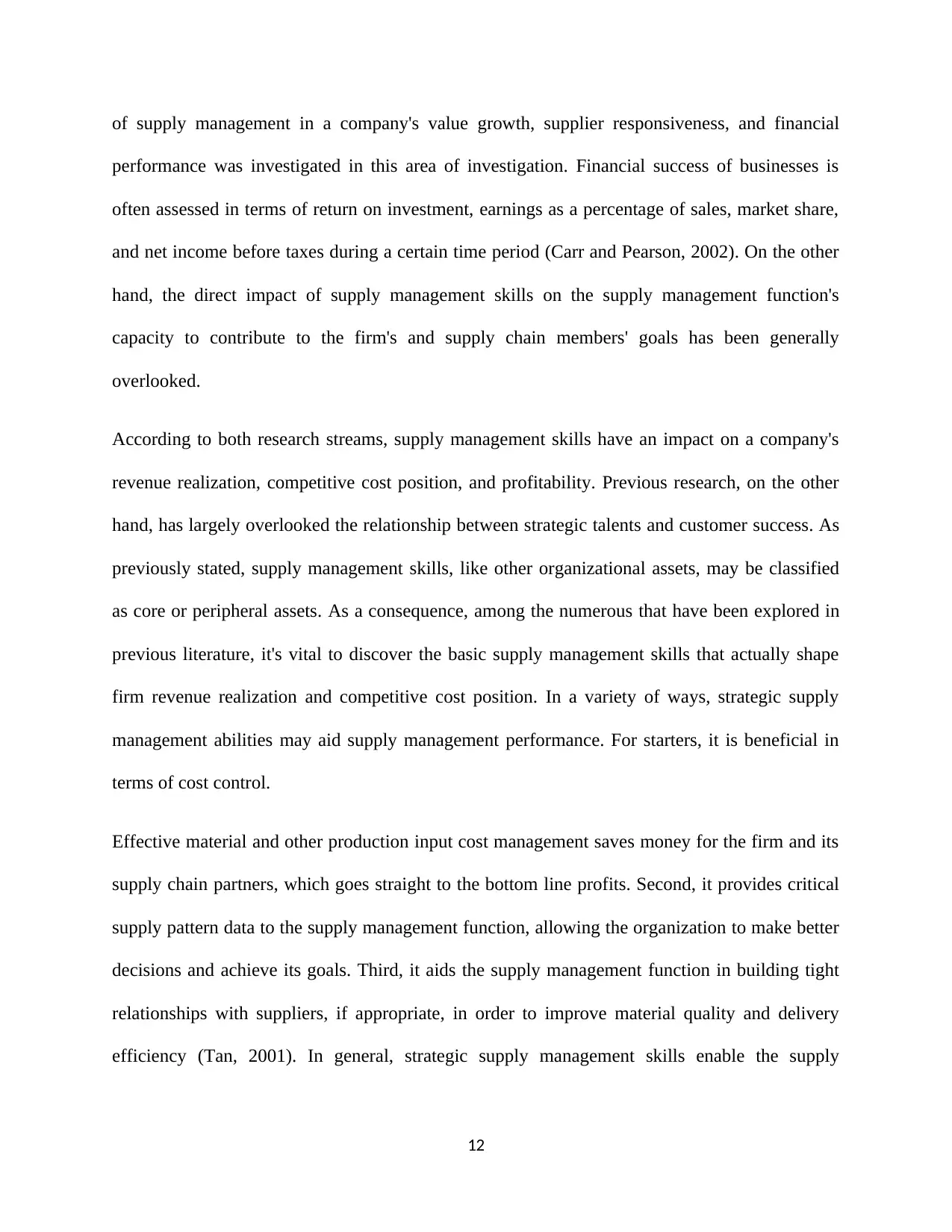
of supply management in a company's value growth, supplier responsiveness, and financial
performance was investigated in this area of investigation. Financial success of businesses is
often assessed in terms of return on investment, earnings as a percentage of sales, market share,
and net income before taxes during a certain time period (Carr and Pearson, 2002). On the other
hand, the direct impact of supply management skills on the supply management function's
capacity to contribute to the firm's and supply chain members' goals has been generally
overlooked.
According to both research streams, supply management skills have an impact on a company's
revenue realization, competitive cost position, and profitability. Previous research, on the other
hand, has largely overlooked the relationship between strategic talents and customer success. As
previously stated, supply management skills, like other organizational assets, may be classified
as core or peripheral assets. As a consequence, among the numerous that have been explored in
previous literature, it's vital to discover the basic supply management skills that actually shape
firm revenue realization and competitive cost position. In a variety of ways, strategic supply
management abilities may aid supply management performance. For starters, it is beneficial in
terms of cost control.
Effective material and other production input cost management saves money for the firm and its
supply chain partners, which goes straight to the bottom line profits. Second, it provides critical
supply pattern data to the supply management function, allowing the organization to make better
decisions and achieve its goals. Third, it aids the supply management function in building tight
relationships with suppliers, if appropriate, in order to improve material quality and delivery
efficiency (Tan, 2001). In general, strategic supply management skills enable the supply
12
performance was investigated in this area of investigation. Financial success of businesses is
often assessed in terms of return on investment, earnings as a percentage of sales, market share,
and net income before taxes during a certain time period (Carr and Pearson, 2002). On the other
hand, the direct impact of supply management skills on the supply management function's
capacity to contribute to the firm's and supply chain members' goals has been generally
overlooked.
According to both research streams, supply management skills have an impact on a company's
revenue realization, competitive cost position, and profitability. Previous research, on the other
hand, has largely overlooked the relationship between strategic talents and customer success. As
previously stated, supply management skills, like other organizational assets, may be classified
as core or peripheral assets. As a consequence, among the numerous that have been explored in
previous literature, it's vital to discover the basic supply management skills that actually shape
firm revenue realization and competitive cost position. In a variety of ways, strategic supply
management abilities may aid supply management performance. For starters, it is beneficial in
terms of cost control.
Effective material and other production input cost management saves money for the firm and its
supply chain partners, which goes straight to the bottom line profits. Second, it provides critical
supply pattern data to the supply management function, allowing the organization to make better
decisions and achieve its goals. Third, it aids the supply management function in building tight
relationships with suppliers, if appropriate, in order to improve material quality and delivery
efficiency (Tan, 2001). In general, strategic supply management skills enable the supply
12
⊘ This is a preview!⊘
Do you want full access?
Subscribe today to unlock all pages.

Trusted by 1+ million students worldwide
1 out of 38
Related Documents
Your All-in-One AI-Powered Toolkit for Academic Success.
+13062052269
info@desklib.com
Available 24*7 on WhatsApp / Email
![[object Object]](/_next/static/media/star-bottom.7253800d.svg)
Unlock your academic potential
Copyright © 2020–2026 A2Z Services. All Rights Reserved. Developed and managed by ZUCOL.



